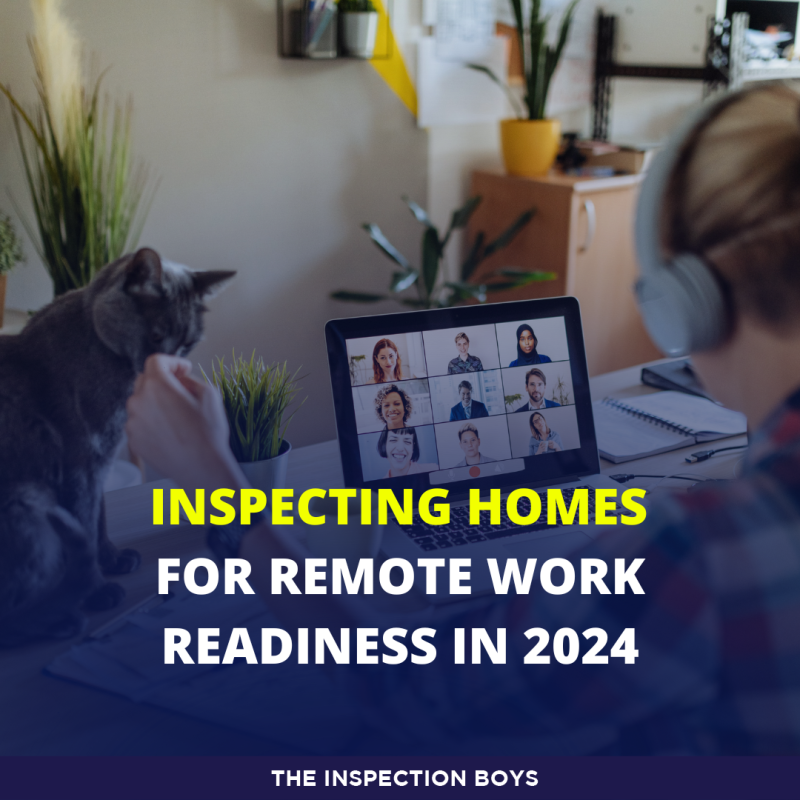The shift toward remote work has become a permanent fixture for many professionals worldwide. With more people working from home, the demand for properties that can support this lifestyle has risen. As a result, home inspectors now need to consider factors that were previously not as crucial, like home office spaces, reliable internet infrastructure, and soundproofing. When evaluating homes for remote work readiness, a thorough home inspection should address these elements to ensure that the property is not only comfortable but functional for work-from-home arrangements.
Assessing Home Office Spaces
Home office spaces have become a priority for buyers, and their importance cannot be overstated. A room or dedicated area for work is now considered essential in modern homes. During a home inspection, it’s vital to evaluate whether there is a suitable space that can be easily converted into an office. A well-designed home office should have good lighting, sufficient electrical outlets, and ventilation.
Inspectors should look for rooms with ample natural light, which can significantly improve mood and productivity. Additionally, it’s important to check for enough power outlets, as remote workers often need to plug in several devices, such as computers, monitors, and other peripherals. Proper ventilation is another critical factor, as it helps maintain air quality, which is key when spending long hours in the same space.
Evaluating Internet Infrastructure
One of the most significant aspects of home inspection services today is evaluating the quality of a home’s internet infrastructure. A fast and stable internet connection is the lifeblood of any remote worker. During the inspection, it’s important to check if the home has a robust internet service provider in the area and if the wiring supports high-speed internet.
Home inspectors can also assess the layout of the home to ensure there are no physical barriers that could disrupt Wi-Fi signals, such as thick walls or awkward floor plans. In homes with ethernet wiring, testing these connections can provide added assurance that the property is ready for high-speed internet use. Additionally, homes with smart technology may already have advanced internet infrastructure in place, which can be a selling point for remote workers.
Soundproofing and Noise Control
Another critical aspect of a home that supports remote work is soundproofing. Whether attending virtual meetings, recording content, or simply needing a quiet environment for concentration, sound control is crucial for any home office space. During the home inspection, it’s worth noting how well-insulated the home is from outside noise.
Inspectors should check the thickness of walls, doors, and windows, as these factors play a major role in soundproofing. Homes located in busy urban areas or near traffic may need additional soundproofing measures like double-paned windows or soundproofing panels. If the home already has carpets or thick curtains, they can also help with noise reduction, though more permanent solutions may be needed in noisier areas.
Heating, Cooling, and Lighting Controls
Remote workers spend a lot of time at home, making it essential that the property provides comfort in terms of temperature and lighting. A home inspection should include checking that the heating and cooling systems are in good working order and can easily regulate temperatures in home office spaces. The ability to control lighting—both natural and artificial—also adds to the functionality of a home office.
For homes with smart lighting or thermostat systems, inspectors can evaluate if these technologies function as intended. Remote workers benefit from being able to control these aspects of their environment for both comfort and energy efficiency, especially during long working hours.
Key Takeaways for Homebuyers and Sellers
For potential homebuyers who plan to work remotely, requesting that home inspectors pay close attention to these features can save time and money later. Homes that are already equipped with the infrastructure to support a remote work lifestyle are likely to hold more value and appeal in today’s market. On the other hand, sellers can increase their property’s attractiveness by ensuring these elements are in place before listing.
Conclusion
As the demand for remote work continues to grow, home inspectors play an increasingly important role in assessing whether a property can meet the needs of remote professionals. By focusing on home office spaces, internet infrastructure, soundproofing, and temperature control, home inspection services can help buyers find homes that not only support daily living but also enhance productivity and comfort in a remote work environment.
Including these aspects in a home inspection ensures that both buyers and sellers are prepared for the demands of the modern workplace, making homes more functional and appealing to today’s remote workers.

